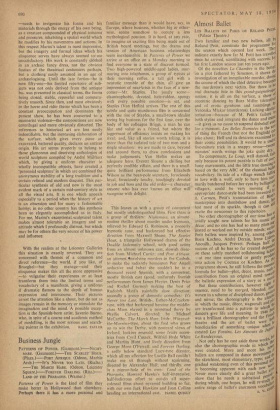Business Jungle
PATTERNS OF POWER. (GaUMOGt.)--NIGHT- MARE. (Gaumont.)--THE SCARLET HOUR. (PlaZa.)--PORT AFRIQUE. (Odeon, Marble Arch.)—IT'S NEVER TOO LATE. (Rialto.) —THE MARCH HARE. (Odeon, Leicester SQUaTe.)—FOREVER DARLING. (Ritz.)— LAND OF THE PHARAOHS. (Warner.)
Patterns of Power is the kind of film they make better in Hollywood than elsewhere. Perhaps there it has a more personal and
familiar message than it would have, say, in Europe, where business, whether big or other- wise, seems somehow to , occupy a less mythological position. It is hard, at any rate, to imagine an exciting film being.made out of British board meetings, but the drama and tension of American business relationships seem inexhaustible. In Patterns of Power we arrive at an office on a Monday. morning to find everyone in a state of discreet turmoil. Two high-powered middle-aged ladies, mur- muring into telephones, a group of typists at their morning coffee, a tall girl with a neurotic tremble of the chin, all give an impression of near:crisis in the face of a new- comer—Mr. Staples. The jungly scene— claustrophobic, devoted, hate-ridden, spongy with every possible emotion—is set, and Staples (Van Heflin) arrives. The rest of this subtle and quite murderous film is concerned with the rise of Staples. a small-tOwn idealist seeing big business for the first time, over the body of his colleague Briggs, a man he can like and value as a friend, but whom the juggernaut of efficiency insists on making his rival; and, like all stories worth telling. it is more than the isolated talc of two men and a single situation: we are made to care, beyond and around them, to draw conclusions and make judgements. Van Heflin makes an adequate hero. Everett Sloane a chilling but perfectly credible villain, and there is a small. quite brilliant performance from Elizabeth Wilson as the bean-pole secretary, ferociously loyal, ferociously touchy, touebingly devoted to job and boss and the old order—a character anyone who has ever known an office will recognise with delight.
This leaves us with a group of competent but mostly undistinguished films. First there is a group of thrillers: Nightmare, an almost- routine thriller about murder tinder hypnosis, relieved by Edward G. Robinson, a properly hypnotic tune, and hackneyed but effective direction from Maxwell Shane; The Scarlet 'Hour, a triangular Hollywood drama of the Double Indemnity school, with good acting from an almost unknown cast. slowish direc- tion from Michael Curtiz; and Port Afrique. an attempt.flInvolving murders in the Casbah. to make the' radiantly homespun Pier Angeli seductive and (what she couldn't be in a thousand years) Spanish. with a competent. mostly British cast (good, uniformly liverish performances from James Hayter, Denis Price and Rachel Gurney) making the best of Rudolnh Mate's painfully slow direction; secondly a group of domestic comedies: It's Never too Late, British-. Esther-McCracken- type, with that hackneyed heroine the middle- class Mum nlayed in a perpetual flurry by Phyllis Calvert. directed. by Michael McCarthy; The March Hare, Irish-. Wings-of- the-Morning-type, about the foal who grows up to win the Derby. with postcard views of Ireland. looking emerald, some fruity eccen- trics from Cyril Cusack. Wilfrid Hyde White and Martita Hunt, and lively direction from George More O'Ferrall; and Forever Darling, a sadly below standard Lucv-tyne disaster, which all my affection for Lucille Ball couldn't make me sit through without squirming, directed by Alexander Hall; and thirdly, one in a pigeon-hole of its own: Land of the Pharaohs. Howard Hawks's half-impressive. half-ludicrous effort to out-do all super- colossal films about pyramid building so far, with our own Jack Hawkins and Joan Collins heading an international cast. ISABEL QU1GLY


































 Previous page
Previous page